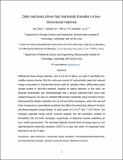Opto-Mechanics Driven Fast Martensitic Transition in Two-Dimensional Materials
Author(s)
Zhou, Jian; Xu, Haowei; Li, Yifei; Jaramillo, Rafael; Li, Ju
DownloadAccepted version (819.2Kb)
Publisher Policy
Publisher Policy
Article is made available in accordance with the publisher's policy and may be subject to US copyright law. Please refer to the publisher's site for terms of use.
Terms of use
Metadata
Show full item recordAbstract
Diffusional phase-change materials, such as Ge-Sb-Te alloys, are used in rewritable nonvolatile memory devices. But the continuous pursuit of readout/write speed and reduced energy consumption in miniaturized devices calls for an optically driven, diffusionless phase change scheme in ultrathin materials. Inspired by optical tweezers, in this work, we illustrate theoretically and computationally that a linearly polarized laser pulse with selected frequency can drive an ultrafast diffusionless martensitic phase transition of two-dimensional ferroelastic materials such as SnO and SnSe monolayers, where the unit-cell strain is tweezed as a generalized coordinate that affects the anisotropic dielectric function and electromagnetic energy density. At laser power of 2.0 × 10[superscript 10]and 7.7 × 10 [superscript 9] W/cm[superscript 2], the transition potential energy barrier vanishes between two 90°-orientation variants of ferroelastic SnO and SnSe monolayer, respectively, so displacive domain switching can occur within picoseconds. The estimated adiabatic thermal limit of energy input in such optomechanical martensitic transition (OMT) is at least 2 orders of magnitude lower than that in Ge-Sb-Te alloy.
Date issued
2018-11Department
Massachusetts Institute of Technology. Department of Nuclear Science and Engineering; Massachusetts Institute of Technology. Department of Materials Science and EngineeringJournal
Nano Letters
Publisher
American Chemical Society (ACS)
Citation
Zhou, Jian et al. "Opto-Mechanics Driven Fast Martensitic Transition in Two-Dimensional Materials." Nano Letters 18, 12 (November 2018): 7794–7800 © 2018 American Chemical Society
Version: Author's final manuscript
ISSN
1530-6984
1530-6992